3 Best Home Security Devices of 2024 – Protect Your Home With Confidence
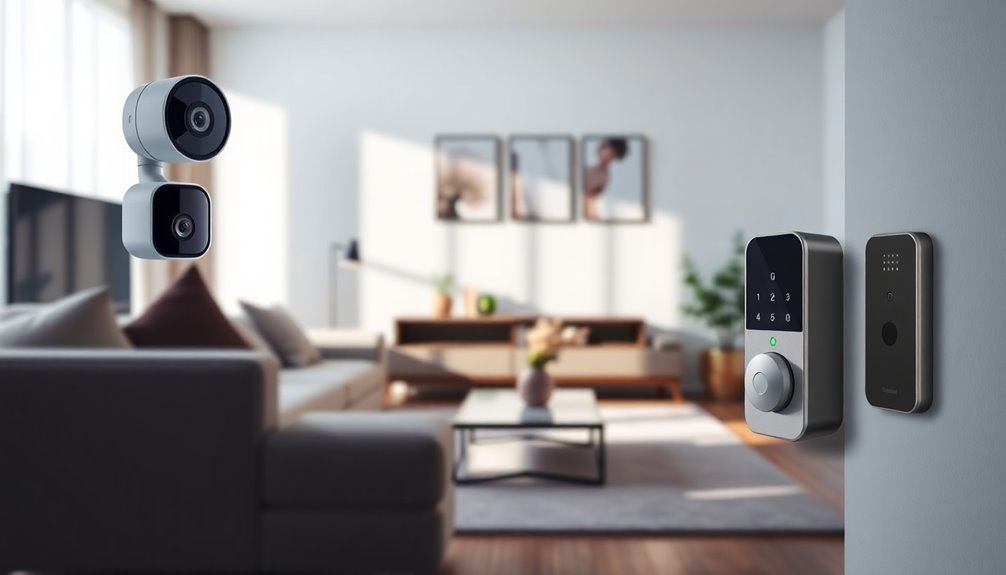
If you want to protect your home with confidence in 2024, consider the EMDMAK Door Stop Alarm, GE Personal Security Window and Door Alarm, and the Tolviviov WiFi Door Alarm System. The EMDMAK features a powerful 120DB siren that deters intruders effectively, while the GE model offers easy installation and a two-pack for extra value. For smart home enthusiasts, the Tolviviov is a wireless option you can set up effortlessly, compatible with Alexa and Google Assistant. These devices enhance your home security, ensuring your family's safety—find out more about their features and benefits to make the best choice.
Key Takeaways
- The EMDMAK Door Stop Alarm features a 120DB siren and adjustable sensitivity, making it ideal for portable security and effective deterrence against intruders.
- The GE Personal Security Window and Door Alarm offers a quick and tool-free installation with a loud 120-decibel alarm, ensuring reliable protection for your home.
- Tolviviov's WiFi Door Alarm System includes multiple sensors and smart compatibility with Alexa and Google Assistant, enhancing home security with modern technology.
- Effective home security devices range from 100 dB to 130 dB, providing ample alert volume while maintaining a balance with neighborhood noise levels.
- Customizable settings, including sensitivity levels and alarm volumes, enable tailored protection to fit individual lifestyles and living environments.
EMDMAK Door Stop Alarm with 120DB Siren (Pack of 2)
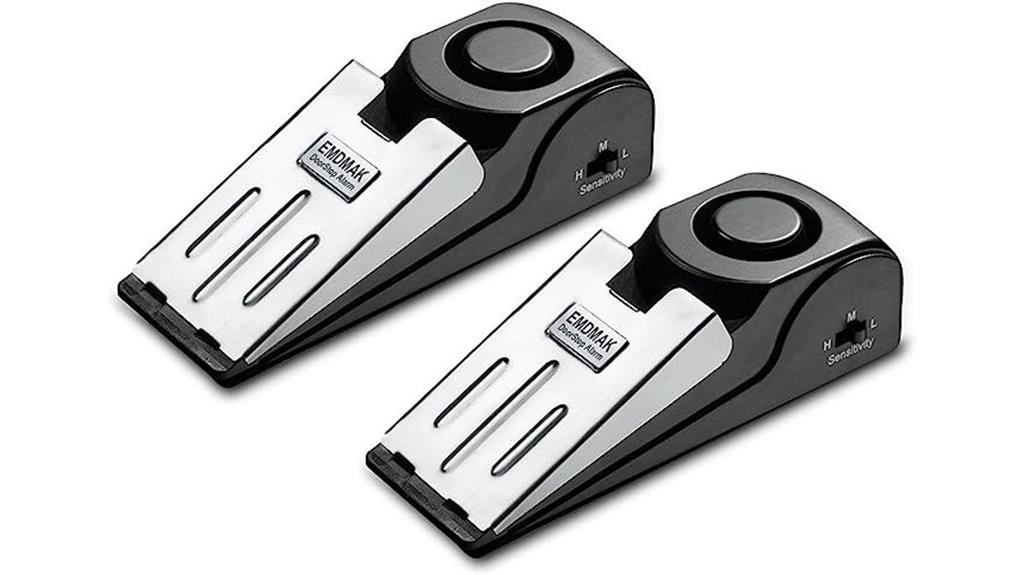
If you're looking for a portable and effective security solution, the EMDMAK Door Stop Alarm with its 120DB siren is an excellent choice, especially for solo travelers. This dual-function device acts as both a door stopper and an alarm, ensuring your door won't slide open while you sleep. With three adjustable sensitivity levels, you can customize it to fit your needs. Weighing only 4.5 oz, it easily fits in your carry-on or backpack, making it perfect for hotel stays or dorms. Users appreciate how simple it is to set up—just place it behind the door and activate it. The loud alarm effectively deters intruders, providing peace of mind wherever you go. It's a must-have for safety-conscious individuals.
Best For: Individuals seeking a portable security solution, especially solo travelers in hotels or dorms.
Pros:
- Dual function as both a door stopper and alarm provides added security.
- Adjustable sensitivity levels allow customization based on user preference.
- Compact and lightweight design makes it easy to carry in luggage or bags.
Cons:
- Best suited for indoor use; may not work effectively on floors without sufficient clearance.
- Some users reported reduced grip on certain floor types, like natural stone.
- Not recommended for outdoor corridors or apartments lacking door gaps.
GE Personal Security Window and Door Alarm (2 Pack)
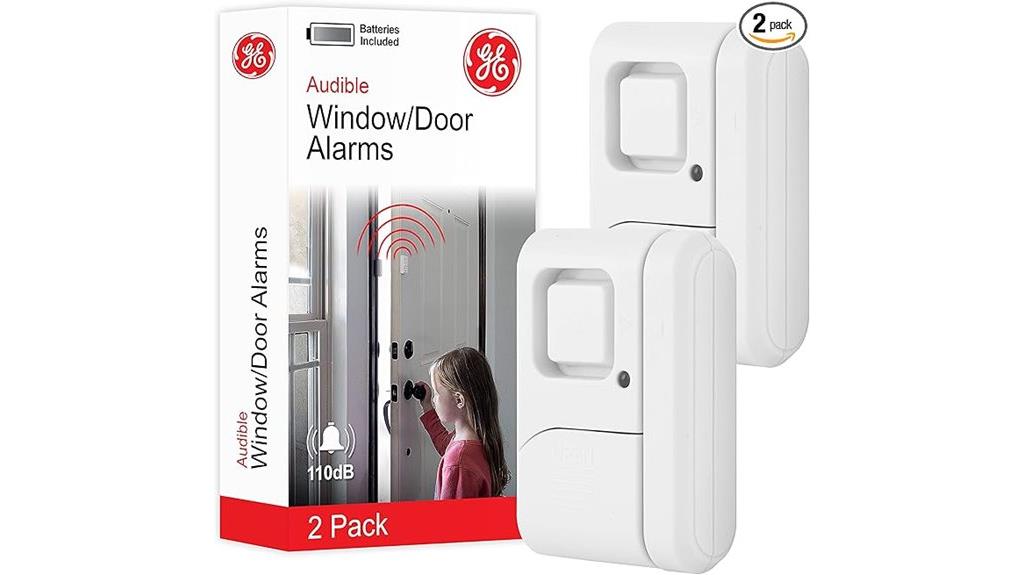
The GE Personal Security Window and Door Alarm (2 Pack) stands out as an ideal choice for anyone seeking an affordable and effective security solution for their home. With a powerful 120-decibel alarm triggered by a high-quality magnetic sensor, it deters potential intruders while alerting you to any openings. You can easily switch between OFF, chime, and alarm modes, and installation takes under 10 minutes with no tools required. Its wireless design and included batteries mean you won't deal with tangled wires or dead batteries too soon. Users appreciate its sensitivity, which can detect even slight movements, providing peace of mind for families with children or pets. Overall, it's a reliable and budget-friendly choice for enhanced security.
Best For: Those seeking an easy-to-install, affordable security solution for their home or apartment.
Pros:
- Loud 120-decibel alarm effectively deters intruders and alerts users to openings.
- Wireless installation allows for quick setup without the need for tools or tangled wires.
- Affordable 2-pack provides excellent value for money and reliable security.
Cons:
- Sensitivity may trigger false alarms from slight movements or breezes.
- Indoor use only, limiting its application for outdoor security needs.
- Battery-powered, requiring periodic battery replacements to maintain functionality.
Tolviviov WiFi Door Alarm System (Wireless DIY Smart Home Security Kit)
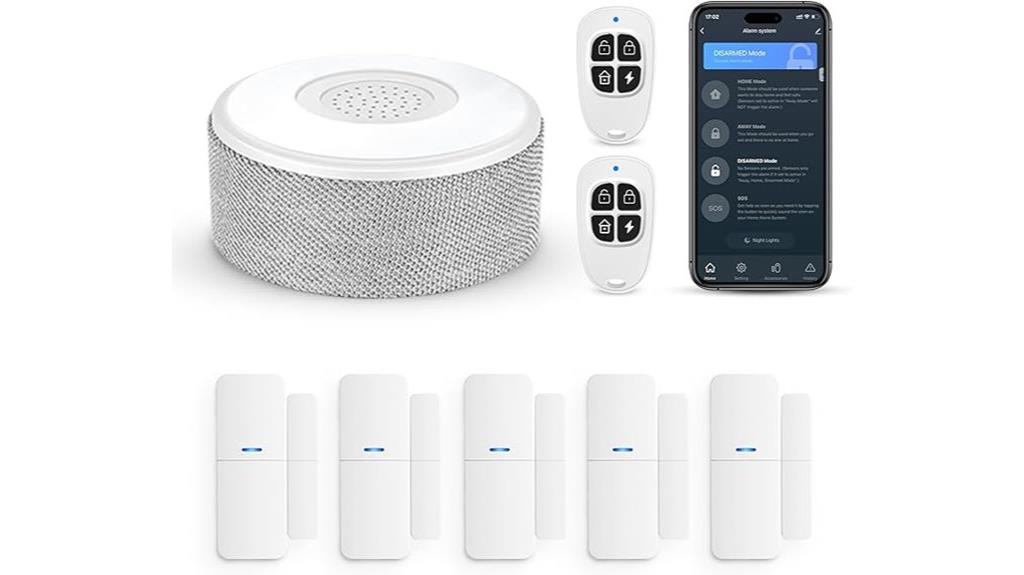
Looking for an affordable and user-friendly security solution? The Tolviviov WiFi Door Alarm System is an excellent choice for anyone seeking peace of mind. This wireless DIY smart home security kit includes an alarm siren, five door/window sensors, and two remote controls, all without contracts or subscription fees. Installation is a breeze—just follow the clear instructions, and you won't need any tools. The system connects to an AC adapter, with a backup battery lasting up to eight hours. Its customizable settings let you adjust alarm volume and entry delays, plus it's compatible with Alexa and Google Assistant. While ideal for small spaces, it may not suit larger homes due to its alarm volume.
Best For: Those seeking an affordable and easy-to-install home security solution for small apartments or homes.
Pros:
- No contracts or subscription fees, making it a cost-effective choice.
- Quick and tool-free installation with clear instructions for all users.
- Customizable settings allow for personalized security preferences and voice control compatibility.
Cons:
- Limited to a single passcode, which may be less secure for families.
- Alarm volume may not be sufficient for larger homes or properties.
- Lacks a chime feature, which some users may find useful for notifications.
Factors to Consider When Choosing Home Security Devices
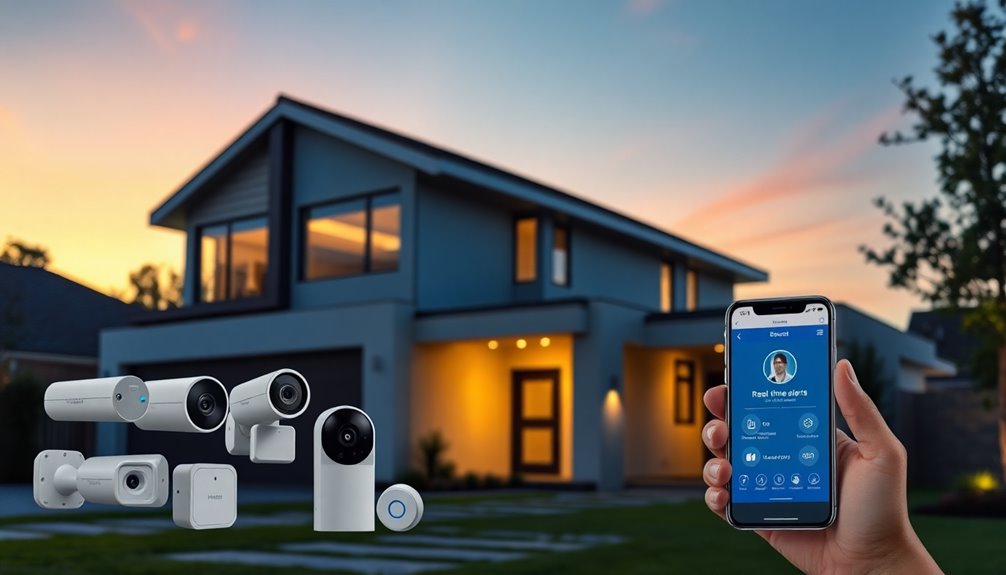
When you're choosing home security devices, several key factors can make a big difference. You'll want to evaluate alarm volume levels, installation ease, and portability, as well as battery life and sensitivity settings. These aspects will help you find a system that fits your needs and lifestyle.
Alarm Volume Levels
Choosing the right alarm volume levels is vital for effective home security. Most effective home security alarms range from 100 dB to 130 dB, providing a loud deterrent for intruders while alerting nearby residents. For instance, a 120 dB alarm can be heard up to 300 feet away, guaranteeing your home is well-protected.
When selecting a security device, consider that many alarms come with adjustable volume levels. This feature lets you customize the sound sensitivity based on your living situation and personal preferences. If you live in a larger home, a higher volume alarm can guarantee alerts reach all areas effectively.
However, it's important to think about the noise tolerance of your household members and neighbors. In densely populated areas, very loud alarms may cause distress or complaints. Balancing effective deterrence with the comfort of those around you is key.
Ultimately, finding the right alarm volume level will enhance your home security while keeping your environment peaceful. Make certain to choose a device that allows you to adjust the volume to suit your needs and circumstances.
Installation Ease
Installation ease is an essential factor to evaluate for anyone looking to enhance their home security. Many home security devices today offer quick installation, often completed in under 10 minutes, with no special tools or skills required. Wireless systems typically use adhesive or double-sided tape for mounting, which means you won't need to drill holes or cause damage to your walls.
DIY installations come with clear instructions, making them accessible even if you're not tech-savvy. For instance, devices like door alarms can simply be placed in position without any setup, allowing for immediate use and flexibility in placement. If you want to change locations, you can easily do so without hassle.
Battery-powered devices further enhance installation ease, as they don't require proximity to electrical outlets. You can place them anywhere within range, which adds to your options for securing your home. By choosing devices designed for easy installation, you can save time and avoid frustration, ensuring that your home security system is up and running quickly and efficiently.
Portability and Size
Portability and size play an essential role in selecting home security devices, especially if you travel frequently or need versatile options for different locations. Compact security devices can easily fit in your carry-on luggage, purse, or backpack, enhancing your travel security without adding bulk.
When considering devices for indoor use, think about how they'll fit in your space. Some may need to fit snugly under doors or against walls without taking up excessive room. The weight of the device also matters; lighter options are easier to transport and reposition as needed, guaranteeing you can adapt your security setup wherever you go.
Look for security devices that allow for quick setup and relocation without requiring complicated installation processes or tools. This way, you won't waste time fumbling with instructions when you need to move your security measures quickly.
Finally, assess the dimensions of the device to confirm it can be discreetly placed without drawing attention. A well-sized device can be effective in its security function while remaining low-profile, giving you peace of mind whether you're at home or away.
Battery Life
When evaluating home security devices, battery life greatly impacts their reliability and performance. You want a device that can operate for an extended period without needing frequent replacements or recharging. Many battery-powered security devices can last up to a year under normal usage conditions, which is ideal for minimizing maintenance.
Look for devices equipped with low battery indicators. These alerts will notify you when it's time for a replacement, helping you maintain continuous security without unexpected lapses. It's also essential to take into account the type of battery used. Some devices may require specific batteries that could be harder to find or replace, adding to your frustration.
Sensitivity Settings
Choosing the right sensitivity settings for your home security devices can make a significant difference in how effectively they protect your space. These settings allow you to customize how responsive your devices are to movement or pressure, enhancing their effectiveness based on your specific environment.
Many security alarms come with multiple sensitivity levels—high, medium, and low. This feature enables you to adjust the device according to the likelihood of disturbances, like pets running around or drafts from windows. A higher sensitivity setting can alert you more quickly to potential intruders, while a lower setting minimizes false alarms in busy areas of your home.
It's essential to take into account your living situation and the potential factors that may trigger alarms. For example, if you live in a high-traffic area or have children and pets, you might want to choose a lower sensitivity level to avoid constant interruptions. On the other hand, if you live alone in a quieter neighborhood, a higher sensitivity setting could offer you the peace of mind you need. Aligning these settings with your lifestyle guarantees that your security system works effectively and efficiently.
Compatibility With Smart Devices
Integrating your home security devices with smart technology can greatly enhance your overall security setup. Many modern systems offer seamless compatibility with devices like Alexa and Google Assistant, allowing you to control your security features with simple voice commands. This integration not only adds convenience but also elevates your home's automation capabilities.
Receiving real-time alerts and notifications on your smartphone guarantees you're always informed about potential security events, enabling prompt action when necessary. Additionally, customizable settings let you adjust alarm volumes, set entry delays, and choose alarm tones that best fit your personal preferences and home environment.
When choosing security devices, make certain they can integrate into your existing smart home ecosystem. This compatibility allows your security devices to work harmoniously with other smart appliances, creating a cohesive and efficient automation experience. Finally, check that the devices support the latest wireless standards, like Wi-Fi 6, to guarantee peak performance and future-proofing against evolving technology. By considering these factors, you can create a robust security system that aligns perfectly with your lifestyle.
Frequently Asked Questions
How Do I Install These Home Security Devices?
To install home security devices, start by reading the manufacturer's instructions. You'll typically need tools like a screwdriver or drill. Choose locations with good visibility for cameras or sensors. Mount them securely, ensuring they're at the right height. Connect the devices to your Wi-Fi network as guided, and download the accompanying app for monitoring. Test each device to confirm it's functioning properly. You're on your way to a safer home!
What Is the Average Lifespan of These Devices?
The average lifespan of home security devices can vary widely depending on the type and brand. Generally, cameras and alarms last around 5 to 10 years with proper maintenance. Smart locks might last about 3 to 5 years, while sensors can function effectively for 5 to 7 years. Regular updates and battery replacements can extend their life. Always check manufacturer guidelines to guarantee you're getting the most out of your devices.
Are These Devices Compatible With Smart Home Systems?
Yes, many of these devices are compatible with smart home systems, allowing you to integrate them seamlessly into your existing setup. You can control security cameras, alarms, and locks through your smartphone or voice assistant. This compatibility enhances your home's security by providing real-time alerts and remote access. Before purchasing, check the device specifications to verify they work with your smart home ecosystem for peak performance and convenience.
Can I Use These Devices for Rental Properties?
Ever wonder how secure your rental property really is? You can absolutely use home security devices for rental properties! They're designed to be user-friendly and easily installed, making them perfect for landlords and tenants alike. Just check the specific requirements for each device to verify compatibility. With the right security measures, you'll not only protect your investment but also give tenants peace of mind. It's a win-win for everyone involved!
What Is the Warranty Period for These Products?
The warranty period for these products typically varies by manufacturer. Most home security devices come with a warranty ranging from one to three years, covering defects and malfunctions. Make sure you read the specific warranty details before purchasing, as some brands offer extended coverage options. If you encounter any issues, you'll want to know how to file a claim and what's covered during that time. Always keep your receipt for warranty validation!
Conclusion
In your quest for a secure sanctuary, selecting the perfect protection is paramount. With the booming brilliance of devices like the EMDMAK Door Stop Alarm, GE Window Alarms, and the Tolviviov WiFi System, you're equipped to fend off fear and foster peace of mind. So, don't hesitate—harness these handy home heroes to safeguard your space and sleep soundly. Remember, a little vigilance goes a long way in creating a cozy, crime-free castle!




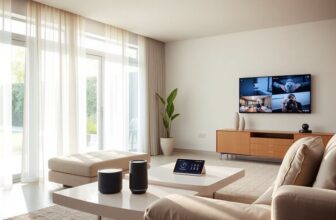

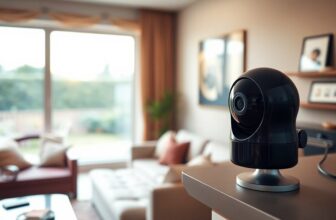
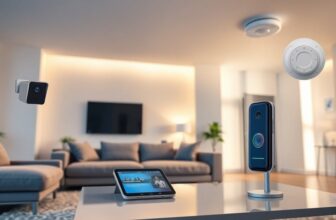
 Wishlist
Wishlist